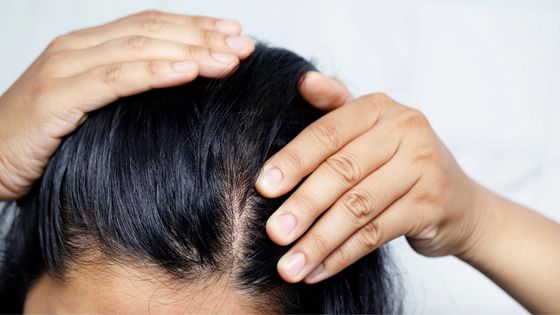Why does my scalp hurt when I move my hair?

Does your scalp hurt when you move my hair? You're probably wondering why your scalp hurts when you move your hair.
It's normal to have some pain and discomfort in your scalp, but it's essential to figure out what's causing it.
This article will explore some of the most common causes of scalp pain and discomfort. We'll also provide some tips on relieving the pain and getting relief from the symptoms.
Why does my scalp hurt when I move my hair?
Scalp pain is a common problem that can be caused by a variety of factors, from tight hairstyles to underlying medical conditions.
One common cause of scalp pain is traction alopecia when the hair is pulled too tightly.
This problem can cause inflammation and damage follicles, resulting in pain and tenderness.
Scalp psoriasis is another possible cause of scalp pain. This chronic condition results in scaly patches on the skin, which can be extremely itchy and lead to hair loss.
If you are experiencing scalp pain, it is essential to see a doctor or dermatologist receive an accurate diagnosis and treatment plan.
Other causes:
- Burning scalp syndrome (scalp dysesthesia)
- Scalp folliculitis
- Scalp psoriasis
- Ponytail headache
- Seborrheic dermatitis (dandruff)
- Stress
- Allergic contact dermatitis
How to tell if scalp pain is something serious or not
Ever feel a twinge of pain on your scalp and wonder if it's something serious? Scalp pain can be caused by various factors, from minor irritations to more severe conditions.
Here are a few things to consider when determining whether your scalp pain is cause for concern:
Location
Where is the pain located on your scalp? Is it isolated to one spot, or does it feel more diffuse?
Localized pain is more likely caused by ingrown hair or contact dermatitis, while more widespread pain could signify tension headaches or migraines.
Intensity
How severe is the pain? Is it a dull ache or a sharp, throbbing sensation? Generally, more severe pain is cause for concern, especially if accompanied by other symptoms like dizziness or nausea.
Duration
How long have you been experiencing the pain? Is it a recent development, or has it been going on for a while?
If the latter, how have you treated it in the past? Chronic scalp pain that doesn't respond to over-the-counter remedies may indicate a more severe condition.
Triggers
Are there any activities or behaviors that seem to make the pain worse? For example, does combing your hair or wearing certain hairstyles make the pain more intense?
Identifying possible triggers can help you, and your doctor determines the cause of your pain.
Accompanying symptoms
Do any other symptoms accompany the pain? That could include itchiness, redness, swelling, tenderness,
What you can do to ease the pain and discomfort
There are a few things you can do to ease the pain and discomfort of scalp pain:
- Take over-the-counter pain relievers like ibuprofen or acetaminophen
- Apply a cold compress to the affected area
- Avoid tight hairstyles or excessive hair brushing
- Gently massage the scalp with your fingertips or a soft brush
- Try relaxation techniques like deep breathing or meditation
If you are experiencing chronic or severe pain, it is essential to see a doctor determine the cause and get appropriate treatment. Untreated scalp pain can lead to hair loss, headaches, and other problems.
When you should see a doctor about scalp pain
If you're experiencing scalp pain, it's essential to pay attention to other symptoms you might be experiencing.
That can help you and your doctor determines the cause of the pain and the best course of treatment.
For example, if the pain is accompanied by redness, swelling, or pus, this could be a sign of an infection.
Scalp pain accompanied by a fever, headache, or rash could also signify a more severe condition such as meningitis.
If you are experiencing any of these symptoms, it's essential to see a doctor right away.
Scalp pain that is not accompanied by any other symptoms does usually not cause concern and can often be treated at home.
However, if the pain persists for more than a few days or worsens over time, it's always best to see a doctor to rule out any underlying conditions.
Some tips for preventing scalp pain in the future
There are a few things you can do to prevent scalp pain in the future:
- First, make sure you're using a gentle shampoo and conditioner. Harsh chemicals can strip the natural oils from your scalp, leaving it dry and irritated.
- Second, be careful not to over-wash your hair. Washing too often can also dry out your scalp, so aim for every other day or third day.
- Finally, use a soft-bristle brush when you brush your hair. That will help to avoid irritating your scalp and causing pain.
By following these simple tips, you can enjoy a healthy, pain-free scalp for years to come.
If you are experiencing chronic or severe pain, it is vital to see a doctor determine the cause and get appropriate treatment. Untreated scalp pain can lead to hair loss, headaches, and other problems.
The bottom line
If you're experiencing scalp pain, we hope this article has given you some relief.
Scalp pain can be frustrating and debilitating, but there are ways to manage it.
We suggest reading our other articles on scalp health for more advice and tips. Thanks for reading!
DISCLAIMER: buildyourbody.org does not provide medical advice, examination, or diagnosis.
Medically reviewed and approved by Nataniel Josue M D.

